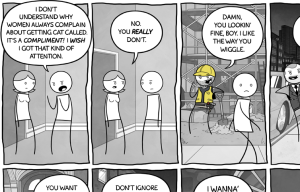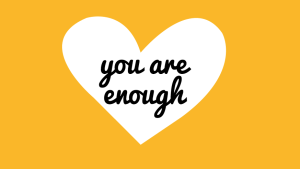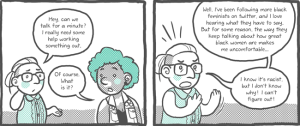Celia: Hey, ya’ll. This is another video in the series I’m doing with Everyday Feminism, which is a website dedicated to helping you stand up to and break down everyday oppression.
In this video I want to talk about positive stereotypes. When we think about stereotyping and why it’s harmful, we usually think about and discuss the negative stereotypes that are associated with social groups.
I’m sure you can think of some. Maybe they’ve been applied to you.
Being Jewish, the stereotype of being cheap has followed me. But there are also positive stereotypes, like Jews are good with money. That seems at least less negative than saying that we’re cheap but it is still a stereotype. That’s the kind of stereotype that I want to talk about.
That said, before I continue I just want to acknowledge that I benefit from privilege and that my Jewishness is not visible simply by looking at me. This protects me from a lot of stereotyping. It’s a much more common and therefore more hurtful for those who are visible minorities. People stereotype them positively and negatively before even speaking to them or finding out anything about them.
The question I want to talk about is: does a stereotype cause harm even if they’re disguised as complementary?
The answer is yes and I’m going to outline a few reasons why.
Firstly, positive stereotypes affect how huge groups of people are treated in different roles. For example, women are stereotyped as being naturally good at nurturing and caring for other people. That sounds lovely – when you don’t think too hard about it.
Women are caring and naturally good at taking care of people. But when you look closer you can see the real repercussions for women in society as a result of this stereotype. Feminized jobs – which are jobs that require the stereotypically feminine traits – jobs like daycare workers, nursery school teachers, and nurses themselves are seen as less requiring of skill and more related to some sort of natural inclination.
Society sees women as naturally good at childcare and as women we’re supposed to love it. When we do take up jobs in that field it’s seen as justifiable to pay us less money. It becomes less about the skills that are involved in taking care of people and more about this supposed “natural desire” to do so. Even if that desire doesn’t actually exist, the positive stereotype obscures the real value and skill that are involved in those jobs.
Another problem with positive stereotypes is that it sets the bar way too high for people who don’t fit the expected mold. The stereotypes that Asian people are hard-working, are smart, and good at math, for instance, seem complimentary. Until you think about the immense pressure that those put on Asian students to achieve unrealistically high grades consistently.
This stereotype does affect teachers, too, in the way they interact with these students. If a student is perceived as being smarter just because of their racial identity, teachers might be less likely to check up on them and offer guidance the way that they would with other students. It can also lead to self-esteem issues when you’re constantly reminded that you’re supposed to be good at something that you are finding challenging.
These stereotypes don’t appear harmful from a distance but they have real consequences on the people who are expected to live up to them.
Next, these stereotypes depersonalize that they’re about. They remove some of a person’s individuality by lumping them into a group and making a judgment based on that group membership. Even if the judgment is that they are especially good at something like black people are good at sports or gay guys are good at shopping, it ultimately takes away something about them as an individual.
It’s really saying that at some level all black people are the same or all gay men are the same. It’s still a mass generalization.
Lastly, and this is an important one, people don’t take it as a compliment even if you mean it that way.
Studies have been done on positive stereotyping. One study for instance: Asian Americans were asked to do a task with a white participant. The white participant was actually an experimenter but the Asian participants didn’t know that.
The task involved some math and some verbal reasoning. The white participant was asked to select who would fill out which part. The white person would then say, “You take this one,” and give the math to the Asian person. In some of the experiments, though, the white person would also say, “I know Asians are good at math so you do this one.”
After the experiment the Asian participant rated how much they liked their partner. And even though it sounds like a compliment to say someone’s good at math, when it involves depersonalizing them according to how they look, turns out people don’t like it.
When the positive stereotype was used the Asian participants liked the white participants less. They reported feeling like they had been reduced to a member of a racial group rather than seen as an individual. There have been more experiments of more groups exposed to positive stereotypes and the results basically show that hearing a positive stereotype leads to dislike of the speaker.
Unless you’re trying to be a jerk, maybe avoid generalizing people, even in a supposedly positive way. Basically, positive stereotypes are more harmful than they might seem. Belonging to a group can and does add a lot to a person’s identity but their membership to that group is not all-encompassing. They’re not just a member, they’re also an individual.
We should avoid adding to the existing pressure for people to exist according to stereotypes. Even if those stereotypes sound nice to you.
And if you exist at the crosshairs of some kind of positive stereotyping, remember that you’re not alone. I’m not the only Jewish person who’s not particularly good with money. And you are good enough even if you don’t fit the mold of your group. It doesn’t make you any less part of that group. It simply means that you’re an individual with strengths and weaknesses just like everybody else.
Let’s try to see each other like that more. Thanks, ya’ll. I’ll see you in my next one.




















